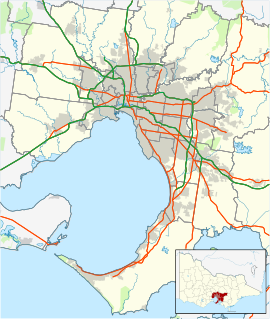Cranbourne, Victoria
Cranbourne is a suburb of Melbourne, Victoria, Australia. It is 49 km (30 mi) south east of Melbourne. It is 50 m (164 ft) above sea-level. Its Local Government Area is the City of Casey.
| Cranbourne Melbourne, Victoria | |||||||||||||||
|---|---|---|---|---|---|---|---|---|---|---|---|---|---|---|---|
 Old Shire Offices, Cranbourne | |||||||||||||||
 | |||||||||||||||
| Coordinates | 38°06′18″S 145°16′44″E / 38.105°S 145.279°E | ||||||||||||||
| Population | 21,281 (2021 census)[1] | ||||||||||||||
| • Density | 2,217/km2 (5,740/sq mi) | ||||||||||||||
| Postcode(s) | 3977 | ||||||||||||||
| Elevation | 62 m (203 ft) | ||||||||||||||
| Area | 9.6 km2 (3.7 sq mi) | ||||||||||||||
| Location |
| ||||||||||||||
| LGA(s) | City of Casey | ||||||||||||||
| State electorate(s) | Cranbourne | ||||||||||||||
| Federal division(s) | Holt | ||||||||||||||
| |||||||||||||||
The Cranbourne area is made up of the suburbs:
- Cranbourne
- Cranbourne East
- Cranbourne North
- Cranbourne South
- Cranbourne West
- Junction Village.
History
changeThe first people to live in the Cranbourne area were the Boonwurrung Aborigines. The first Europen settlers were the Ruffy brothers who arrived in 1836. They later opened the Cranbourne Inn.
The area was opened up by settlers from the 1860s. Progress in developing the land around Cranbourne was difficult because of the Koo Wee Rup swamp. William Lyall bought land in the swamp area. He helped organize draining the swamp to make it usable as farmland. The region has a strong farming history. A major cattle market started at Cranbourne in the 1870s. This was helped with the arrival of the railway in 1887. A market gardening industry began after World War I with the arrival of Italian immigrants.
Cranbourne has a long history of horse racing. The first races were held in 1867. The Cranbourne Racecourse and Recreation Reserve and the Cranbourne Training Complex are popular facilities. There is a Cranbourne Cup race meeting every year as well as other carnivals.
In the 1860s, a number of iron meteorites were discovered in the area. The largest, at 3.5 tonnes, was at the time, the largest discovered in the world. It was known as the Cranbourne meteorite. It was sold to the British Museum.
Cranbourne was made a town in 1861. The Shire of Cranbourne was begun in 1868. The office, built in 1875, is still standing on the corner of South Gippsland Highway and Sladen Street. In 1994 the Shire was made a City. Later in the same year most of the City joined with the City of Berwick to form the City of Casey.
Rapid growth
changeOver the years Cranbourne has changed from a small country town to a rapidly growing suburb. The exact time of when Cranbourne had changed from town to suburb is not really known. The number of people living in Cranbourne has grown quickly since the 1970s. There were 1,800 people in 1976, rising to 14,005 in 1986 and 18,886 in 1991. Cranbourne's current population is estimated to be at least 30,000 people.
Sport
changeCranbourne has many sports facilities including:
- Amstel Golf Club
- Bowland (a ten-pin bowling complex)
- Casey Fields
- Casey Indoor Sports Centre
- Cranbourne Golf Club
- Cranbourne Racecourse & Recreation Reserve
- Donnelly Recreation Reserve
- J. and P. Cam Reserve
- Lawson Poole Reserve
- Ranfurlie Golf Club
- Sports Centre (basketball, netball, and indoor soccer)
- swimming pool
- The Shed (an indoor skating facility).
Botanic Gardens
changeThe Royal Botanic Gardens, Cranbourne is a part of Melbourne's Royal Botanic Gardens. At Cranbourne there are a lot of Australian plants on display. One feature is an arid lands garden which has a red sand dune with desert plants.
Schools
changeSchools in the Cranbourne area include:
- Courtenay Gardens Primary School
- Cranbourne Christian College
- Cranbourne Primary School
- Cranbourne Park Primary School
- Cranbourne East Primary School
- Cranbourne East Secondary College
- Cranbourne Secondary College
- Cranbourne South Primary School
- Cranbourne Specialist School
- Cranbourne West Primary School
- Lyndhurst Secondary College
- Rangebank Primary School
- St.Agathas Catholic School
- St.Peters Catholic Co-Ed College
- St.Theresa's Catholic Primary School
- Cranbourne Carlisle Primary School.
Because of the growth in Cranbourne several new primary schools are being planned.
Chisholm Institute of TAFE also has a campus in Cranbourne, to the city's east.
Shopping centres
changeShopping centres in the Cranbourne area include:
- Centro Cranbourne Shopping Centre
- Great Southern Home Centre
- Thompson Parkway Shopping Centre.
- Springville Shopping Centre.
Events
changeThe MRA Cranbourne GP Run is held each year on the Saturday of the Australian Motorcycle Grand Prix.
Cranbourne races are a regular event on the racing calendar. Greyhound and harness racing are also held.
Public transport
changeMelbourne's suburban railway links the suburb to Melbourne. The terminus of the Cranbourne railway line is at Cranbourne railway station. Merinda Park station is in Cranbourne North.
Other websites
change- Amstel Golf Club
- Bowland Archived 2006-08-20 at the Wayback Machine
- Casey Fields Archived 2007-12-22 at the Wayback Machine
- Casey Indoor Sports Centre Archived 2006-08-20 at the Wayback Machine
- Centro Cranbourne Shopping Centre
- Cranbourne Golf Club
- Cranbourne weather forecasts and climate averages
- Cranbourne photos
- The Shed Archived 2007-09-01 at the Wayback Machine
References
change- ↑ Australian Bureau of Statistics (28 June 2022). "Cranbourne (Suburbs and Localities)". 2021 Census QuickStats. Retrieved 10 July 2022.
